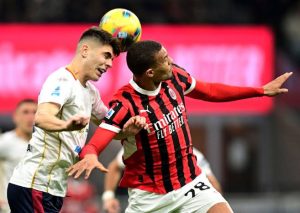UNBELIEVABLE: John Oliver has announced a stunning retirement and departure immediately after facing…..

UNBELIEVABLE: John Oliver has announced a stunning retirement and departure immediately after facing…..
In its first two episodes, John Oliver’s news-satire show, “Last Week Tonight,” which airs on Sunday nights, on HBO, devoted long segments to the ongoing Indian elections and to the status of the death penalty in the United States. In each case, Oliver, grinning, but with serious, almost desperate purpose, argued that these were subjects that Americans, either out of ignorance or owing to an aversion to facing hard truths, were talking and thinking much too little about. Of the Indian election, in which more than eight hundred million people are eligible to vote, but which has received scant U.S. cable-news coverage, he said, “If this story isn’t worth covering, then nothing is worth covering.” Regarding the death penalty—which was in the news last week, after a botched lethal injection in Oklahoma—Oliver reached for simile: “The death penalty is like the McRib. When you can’t have it, it’s so tantalizing. But when they bring it back, you think, This is ethically wrong.”
“Last Week Tonight” looks and sounds a lot like Jon Stewart’s “The Daily Show,” where, beginning in 2006, Oliver worked as a writer and an on-air correspondent; this past summer, he guest-hosted the show to career-making effect. At the outset of “Last Week Tonight,” the studio audience cheers wildly, and it laughs reliably throughout. Oliver leans eagerly over his desk, as if in a hurry to fit all of his amused outrage into the half hour. Ironic images flash in the top left of the screen, either amplifying or jarringly contrasting what Oliver is saying. (During the death-penalty segment, there was a picture of Winnie the Pooh holding a syringe.) Politicians and cable-news personalities come in for scathing attack in equal measure, with short video excerpts used to reveal idiocy, mendacity, and hypocrisy. In the first episode, there was a bit featuring a the musician Lisa Loeb mocking Oregon’s health-care ads, as well as a delightfully strange confrontational interview with Keith Alexander, former head of the N.S.A. Most notably, Oliver, who, in interviews, repeatedly emphasizes the debt that he owes to Stewart, shares Stewart’s basic tonal template: aggrieved by the necessity of the task at hand, as if to remind the audience that, in a better world, it wouldn’t fall to a comedian to straighten out all these serious issues for us.
This irritation, however, is mostly a sleight. Oliver, who is thirty-seven, established his comic voice in Britain by pillorying conservative social values and entrenched institutions: the Catholic Church, the monarchy, finance types, vain and dangerous dictators and autocrats. The pompous and the powerful have long been targets of his hyper-articulate, profanity-happy outrage—in his standup shows, his appearances on the British panel show “Mock the Week,” in the mid-aughts, and on his consistently brilliant and uproarious weekly news-satire podcast, the Bugle, which he has recorded with Andy Zaltzman, a fellow British comedian, since 2007. (One hopes that Oliver’s new gig doesn’t mean the end of the Bugle.) Many of the subjects of recent Bugle episodes hint at the kinds of stories that Oliver will tackle on television—for example, his fascination with the Indian politician Narendra Modi. As is typical of Oliver’s delivery, what begins as a simple explanation of facts grows louder and more urgent before escalating to a crescendo of silliness. On a March podcast, he said, of Modi’s campaign slogan, “Toilets Not Temples,” “He’s running on a pro-toilet platform. It works both as a positive for him and negative for his opponent, because he is essentially saying, ‘My opponent wants you to shit in the street.’” Then Zaltzman chimed in: “Or to shit in the temple.” There is something winning about hearing the two men laugh at each other’s jokes.
By himself on television, Oliver rehashed the bit about Modi and the toilets, but was less profane and noticeably more earnest about why something like toilets matter: “This is both funny and incredibly important as a public-health issue.” If the Bugle is smart-alecky schoolboy nonsense, then “Last Week Tonight” is a schoolboy putting on a blazer and playing it straight(er). The show’s strengths are its writing and Oliver’s insistent delivery. When talking about Rahul Gandhi, the Indian candidate for prime minister, he said, “So let’s deal with Gandhi first—and I realize it is not the first time that sentence has been said in a British accent.” And Oliver has not blunted his edges. In a segment mocking the nefariousness of food labels, he showed a Pop-Tarts ad that touts the product’s “real fruit” and promises that feeding the breakfast pastry to your kids will make them rise and will make you shine. To this, Oliver responds, “Fuck you. And I’ll tell you why: because there is no significant amount of fruit in Pop Tarts, and within thirty seconds of eating your children will not rise and shine, they’ll run around punching people in the dick before collapsing into a puddle of tears.” (HBO doesn’t bleep out the dirty words.) Among the current handful of American late-night hosts, only Oliver could successfully deliver such a line.
This assured start has led some people to the snap judgment that Oliver has surpassed Stewart, or that “Last Week Tonight” harkens back to Stewart’s better days, when he was a more joyful culture warrior. The show has been called the “All Things Considered” of late-night news satire (by the New York Times) and the Al Jazeera of late-night news satire (by the Los Angeles Times). Both comparisons are nods to its deeper dives into the issues—the weekly schedule affords it more time for research and polish than “The Daily Show,” which airs four nights a week—and to its focus on international news. (The show’s set, which looks at first like a bland cityscape, is, in fact, made up of famous buildings from around the world, a kind of Esperanto skyline.)





